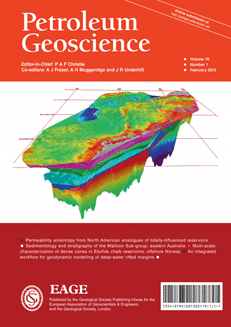
PETROLEUM GEOSCIENCE
Scope & Guideline
Uncovering Insights in Petroleum Production
Introduction
Aims and Scopes
- Petroleum Systems Analysis:
Research in this area investigates the generation, migration, and entrapment of hydrocarbons, providing insights into the entire petroleum system from source rocks to reservoirs. - Geophysical and Geological Modelling:
The journal emphasizes the integration of geological and geophysical data to create models that predict reservoir behavior, fluid flow, and the structural integrity of subsurface formations. - Reservoir Characterization:
Papers often focus on the petrophysical and geological features of reservoirs, including their composition, fluid dynamics, and the impact of geological processes on hydrocarbon recovery. - Innovative Technologies and Methodologies:
The journal encourages the use of advanced techniques such as machine learning, deep learning, and numerical modeling to solve complex geoscientific problems in petroleum exploration. - Environmental and Sustainability Studies:
Research addressing the environmental impacts of petroleum extraction and the potential for carbon capture and storage (CCS) is increasingly prominent, reflecting a growing concern for sustainable practices in the industry.
Trending and Emerging
- Machine Learning and AI Applications:
There is a growing trend towards utilizing machine learning and artificial intelligence for predictive modeling, data analysis, and enhancing reservoir characterization processes. - Carbon Capture and Storage (CCS) Research:
An increase in studies focused on CCS indicates a significant trend toward addressing climate change impacts and the role of geoscience in sustainable petroleum practices. - Integrated Data Approaches:
The integration of various datasets (geophysical, geological, petrophysical) to enhance reservoir modeling and fluid flow predictions is increasingly emphasized, showcasing a move towards more holistic analyses. - Geomechanical Studies:
Research focusing on the mechanical properties of rocks and their implications for fluid migration and reservoir integrity is on the rise, reflecting a heightened awareness of geomechanical factors in exploration and production. - Impact of Climate Change on Petroleum Systems:
Emerging studies are beginning to address how climate change affects hydrocarbon systems, including the implications for exploration strategies and reservoir management.
Declining or Waning
- Traditional Exploration Techniques:
There has been a noticeable decrease in publications focusing solely on traditional exploration methods, such as basic seismic interpretation and well logging, as more advanced and integrated approaches gain traction. - Static Reservoir Models:
Research that relies heavily on static models without incorporating dynamic data or real-time monitoring has waned, as the industry increasingly favors dynamic simulation and real-time data integration. - Regional Geological Studies:
Papers focusing exclusively on regional geological surveys or descriptions without a direct application to petroleum exploration or production have become less frequent, as the journal pivots towards more applied research.
Similar Journals

SPE RESERVOIR EVALUATION & ENGINEERING
Bridging Academia and Industry in Reservoir InnovationsSPE RESERVOIR EVALUATION & ENGINEERING, published by the Society of Petroleum Engineers, is a leading academic journal that plays a pivotal role in the fields of energy engineering and geology. With a notable Q2 ranking in Energy Engineering, Fuel Technology, and Energy (Miscellaneous), as well as a Q1 ranking in Geology, this journal is recognized for its high-quality, peer-reviewed research contributions that enhance our understanding of reservoir evaluation and engineering practices. Since its inception in 1999, the journal has aimed to disseminate innovative techniques and methodologies applicable to both academia and industry. Available in both print (ISSN: 1094-6470) and online (E-ISSN: 1930-0212) formats, it ensures wide accessibility to its content even as it embraces Open Access options for select titles. Researchers, professionals, and students alike can benefit from the rich repository of technical papers, case studies, and reviews, all designed to advance knowledge and applications in the ever-evolving energy sector.

Petroleum Exploration and Development
Advancing the Frontiers of Petroleum SciencePetroleum Exploration and Development is a premier open-access journal published by KEAI PUBLISHING LTD, dedicated to advancing the fields of petroleum exploration and extraction as well as associated technologies. Since its inception in 2008, the journal has established itself as a key resource for researchers and professionals across various disciplines, evidenced by its impressive Q1 rankings in multiple categories including Economic Geology and Energy Engineering. With an impact factor that reflects its high citation rates and academic significance, this journal offers a unique platform for disseminating cutting-edge research related to geological studies, geochemistry, and energy sustainability. By making all its content freely accessible, Petroleum Exploration and Development ensures that its findings are available to a global audience, fostering collaboration and innovation within the community. Researchers, industry professionals, and students will find valuable insights and advancements in the realm of petroleum science, making it an essential part of their academic and professional libraries.
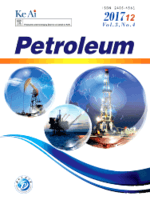
Petroleum
Catalyzing knowledge exchange in the dynamic petroleum sector.Petroleum, an esteemed open-access journal published by KEAI PUBLISHING LTD, serves as a premier platform for disseminating high-quality research in the fields of energy engineering, fuel technology, geology, and related earth sciences. Established in 2015, the journal exemplifies innovation and scholarly rigor with a commendable ranking in the second quartile across multiple categories, including Energy Engineering and Geopolitics. With a focus on advancing knowledge and practices in the petroleum sector, it encourages submissions that encompass a broad spectrum of topics from exploration and extraction techniques to environmental impacts and sustainability measures. Based in Beijing, China, this journal's impact is further enhanced by its significant presence in the Scopus database, achieving impressive percentiles, such as the 95th for Geology and 93rd for Geochemistry and Petrology. The open-access model fosters unrestricted global collaboration and accessibility, making the latest research available to a diverse audience of researchers, professionals, and students eager to innovate and lead in the burgeoning energy landscape.

PETROLEUM CHEMISTRY
Transforming Knowledge into Progress in Petroleum Chemistry.Petroleum Chemistry is a premier journal dedicated to the advancement of knowledge in the field of petroleum science and technology. Published by MAIK Nauka/Interperiodica/Springer, it serves as a vital resource for researchers, professionals, and students interested in various aspects of petroleum chemistry, including exploration, extraction, and processing. With an ISSN of 0965-5441 and an E-ISSN of 1555-6239, the journal has a robust publication history, converging from 1991 to 2024. It holds a respectable position in the academic community, as evidenced by its category quartiles in 2023, being ranked in the Q3 tier across multiple disciplines such as Chemical Engineering, Chemistry, and Energy Technology. Although the journal is not open access, it offers comprehensive insights that fuel ongoing research and innovation within the sector, making it essential reading for those invested in the future of energy and fuel technology.

COMPUTATIONAL GEOSCIENCES
Bridging Theory and Application in GeosciencesCOMPUTATIONAL GEOSCIENCES, published by SPRINGER, is a distinguished journal in the fields of Computational Mathematics, Computational Theory and Mathematics, and Computer Science Applications. With a focus on the intersection of computational methodologies and geosciences, this journal serves as a vital platform for researchers, professionals, and students seeking to advance the understanding and application of computational techniques in earth sciences. The journal has consistently maintained a strong standing, evident from its impressive Q2 quartile ranking in 2023 across various categories, and significant Scopus rankings in Computational Mathematics and Earth and Planetary Sciences. The global impact of this journal is underscored not only by its rigorous peer-review process but also by its commitment to disseminating high-quality research that bridges theoretical advances and practical applications within the earth sciences domain. Scientifically rich and culturally diverse, COMPUTATIONAL GEOSCIENCES aims to foster collaboration and innovation while addressing pressing challenges posed by our changing planet, making it an essential resource for the academic community.
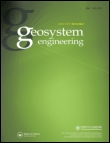
Geosystem Engineering
Elevating standards in environmental quality and waste strategies.Geosystem Engineering, published by Taylor & Francis Ltd, is a prominent academic journal focusing on the interdisciplinary fields of Environmental Engineering, Pollution, and Waste Management and Disposal. With an ISSN of 1226-9328 and an E-ISSN of 2166-3394, this journal has been a significant contributor to the scholarly discussions since its inception in 1998 and continues to publish impactful research up to 2024. As a recognized journal within the Q3 category for its respective fields as of 2023, it serves as a vital platform for researchers, professionals, and students aiming to disseminate findings, share innovations, and address pressing environmental challenges. Although it does not currently offer Open Access options, Geosystem Engineering remains essential for those invested in advancing sustainable practices and technologies in geosystems. The journal delivers critical insights that contribute to the development of policies and practices aimed at improving environmental quality and waste management strategies globally.
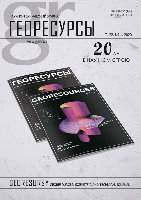
Georesursy
Connecting Minds for Earth Science AdvancementGeoresursy is a leading open access journal published by LTD GEORESURSY, serving as a vital platform for the dissemination of research in the fields of Geology and Geophysics. Operating from the Russian Federation, the journal has maintained its open access status since 2000, promoting global scholarship and accessibility to researchers, professionals, and students alike. With an ISSN of 1608-5043 and an E-ISSN of 1608-5078, Georesursy has established itself as a reputable source, currently holding a Q2 ranking in both the categories of Geology and Geophysics in 2023. This journal is indexed in Scopus, ranking #103 out of 165 and #201 out of 321 in Earth and Planetary Sciences for Geophysics and Geology, respectively. The impressive impact of the journal is underscored by its convergence years from 2017 to 2024, illustrating its commitment to advancing geological and geophysical research. We encourage contributions that reflect innovative methodologies, critical analysis, and interdisciplinary approaches essential for the progress of earth sciences.
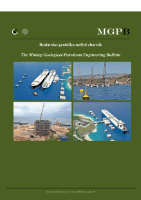
Rudarsko-Geolosko-Naftni Zbornik
Uncovering Insights in Mining and Petroleum EngineeringRudarsko-Geolosko-Naftni Zbornik, the esteemed journal published by the University of Zagreb's Faculty of Mining, Geology and Petroleum Engineering, serves as a vital platform for advancing knowledge in the fields of Earth sciences, energy, and geology. With an ISSN of 0353-4529 and an E-ISSN of 1849-0409, this open-access journal has been disseminating high-quality research since 1989, contributing significantly to scientific discourse in Croatia and beyond. As of 2023, it holds an impressive categorization in various quartiles, notably achieving Q2 in Earth and Planetary Sciences and Q3 in several related domains, showcasing its relevance and impact within the academic community. The journal's commitment to quality is reflected in its Scopus rankings, placing it in competitive positions across diverse disciplines. Researchers, professionals, and students alike will find invaluable resources and insights that foster innovation and collaboration in their respective fields, making Rudarsko-Geolosko-Naftni Zbornik an essential read for those dedicated to exploring the complexities of natural resources and environmental challenges.

SOCAR Proceedings
Pioneering Research for a Sustainable Energy Future.SOCAR Proceedings is a distinguished academic journal published by the State Oil Company of the Azerbaijan Republic, specifically from the Oil Gas Scientific Research Project Institute. This journal addresses vital aspects of various interdisciplinary fields including Applied Mathematics, Chemical Engineering, Energy Engineering, and Geosciences, making it an essential resource for researchers and professionals alike. Since its inception in 2010, SOCAR Proceedings has cultivated significant contributions to the knowledge base, particularly as it boasts a respectable Q3 category ranking across several relevant fields for 2023. As a journal known for its commitment to disseminating innovative research, it offers invaluable insights into the energy sector that are particularly pertinent to the regional and global challenges posed by resource management and environmental sustainability. With an evolving focus up to 2024, SOCAR Proceedings continues to foster scholarly dialogue and research advancements, making it a vital forum for students and academics looking to deepen their understanding of energy and engineering sciences.

SPE Production & Operations
Fostering Collaboration in Fuel Technology ResearchSPE Production & Operations is a prestigious journal published by the Society of Petroleum Engineers (SPE), focusing on the critical domains of energy engineering and fuel technology. With an ISSN of 1930-1855 and an E-ISSN of 1930-1863, this journal has established itself as a vital resource in understanding the intricacies of production and operational practices within the petroleum sector. Its impressive Q2 ranking in both Energy Engineering and Power Technology, and Fuel Technology reflects its commitment to providing high-quality, impactful research. Spanning years from 2006 to 2023, SPE Production & Operations maintains an open access policy that ensures widespread dissemination of research findings, promoting knowledge sharing among industry professionals, researchers, and students alike. As the energy landscape continues to evolve, this journal serves as an essential platform for innovative research and discussion that addresses contemporary challenges and advancements in the field.